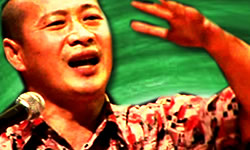Plagiarism: Much more than storm in Tee cup

A serious charge of academic dishonesty has been allowed to remain unanswered since 2010 when the authorities were first notified about it. Apparently nothing has been done by the university authorities or the Ministry in charge of higher education. Worse still, the alleged guilty party has been promoted rapidly in the university system.
Lim Teck Ghee, CPI
The case of prominent Utusan Malaysia columnist, Ridhuan Tee Abdullah, who has been accused of plagiarism should be of public concern for several reasons.
Firstly, within academia, there are few worst sins than plagiarism. The term “sin” may appear to be too strong but Ridhuan Tee who, regularly from his Utusan Malaysia pulpit, dishes out his pseudo-intellectual views on developments in the country from a supposedly Islamic perspective probably will understand better the use of this term in the context of the wrongdoing he is alleged to have committed. Or then again, perhaps he does not.
Generally, university students enrolled in any university in the world – whether reputable or not – are taught right from the start that they cannot simply lift or copy the work of others without acknowledging and citing the source. This is cardinal rule number 1 – the need to differentiate between one’s own work and that of others.
The rule is rigorously enforced not only to encourage the student to engage in fresh and original work that stems from his own thought processes but also to protect the intellectual property rights of others whose works, ideas or words have been borrowed.
In the case of the allegation made against Ridhuan, apparently he has copied not only entire paragraphs but also the grammatical errors which appeared in the original blog article.
According to the initial report on the allegation, UTM lecturer Dr Airil Yasreen Mohd Yassin claimed that Ridhuan’s individual assignment for the Grade DS51 Efficiency Level Assessment (PTK4) coursework conducted from May to June 2010, contained paragraphs he had written in his blog in 2009.
Punishment for plagiarism
The penalty for plagiarism is always severe so as to punish the offender and to discourage others from engaging in it. If the work is an essay or a project paper and the plagiarism is proven, this below is an example – according to a handbook for its freshman composition course that all undergraduates are required to take – of the penalty imposed by Harvard University.
Harvard policy requires instructors to report all suspected cases to the dean of the college, and most such cases are ultimately adjudicated by the administrative board. If the majority of board members believe, after considering the evidence and your own account of the events, that you misused sources, they will likely vote that you be required to withdraw from the college for at least two semesters.
Since a vote of requirement to withdraw is effective immediately, you lose all coursework you have done that semester (unless it’s virtually over), along with the money you have paid for it. You must leave Harvard; any return to campus will violate the terms of your withdrawal. You must find a full-time job, stay in it for at least six months, and have your supervisor send a satisfactory report of your performance in order to be readmitted. … Finally, any letter of recommendation written for you on behalf of Harvard College – including letters to graduate schools, law schools, and medical school – will report that you were required to withdraw for academic dishonesty. If you are required to withdraw for a second time, you will not, ordinarily, be readmitted.
(see http://www.slate.com/articles/news_and_politics/chatterbox/2002/01/doris_kearns_goodwin_liar.html)
No action by the authorities
In response to the renewed disclosure of his alleged wrongdoing, Ridhuan Tee has accused his critics of “character assassination” and challenged them “come and face me upfront”.
This matter is not whether one side or the other has the “telur” (cojones) to confront the other and slug it out. It is one in which stakeholders, who should be concerned about the integrity of our academic system, will need to take a position so that the charge is resolved once and for all, and repetition of such instances is deterred.
There is a second cause of concern. A serious charge of academic dishonesty has been allowed to remain unanswered since 2010 when the authorities were first notified about it. Apparently nothing has been done by the university authorities or the Ministry in charge of higher education. Worse still, the alleged guilty party has been promoted rapidly in the university system.

